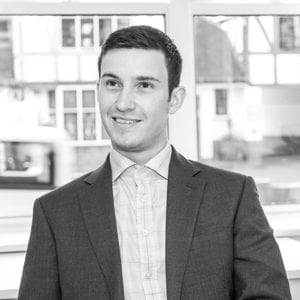Working at the forefront of innovation is everything I had hoped it would be: fast-paced, fascinating, and intellectually stimulating. More than this, the work is incredibly varied; in the last month alone, my days have been spent on topics including x-ray diffractometers, medical devices, internal combustion engines, and glass-making! Being able to switch between these disparate subject areas is certainly challenging, but all part of the enjoyment.
How did I get here?
I studied for a Masters in Mechanical Engineering, attracted by the breadth of technical content offered. However, as I progressed through the course and began to look at careers, it became clear that I would have to work in progressively more narrow subject-areas, whereas I wished to use, or even broaden, the full scope of my understanding.
I stumbled across a seemingly more suitable career in the penultimate year of my course: Intellectual Property. The profession seemed rather unorthodox, with little information being provided at university. Instead, I relied on websites such as Inside Careers to find out more about the profession. Later on, I was lucky enough to attend a week-long placement at an IP firm, where I caught a glimpse of the day-to-day work of a patent attorney. The placement was the perfect length for me to judge whether I’d enjoy the career, and I was able to compare the experience with a later engineering placement. There was no contest between the two, and I started applying for IP vacancies in October of my final year.
Soon after applying, I interviewed at Elkington and Fife LLP (E+F) for the role of Technical Assistant within their Electro-Mechanical Group. The interview process at E+F was well thought out and the tasks, while difficult, seemed to be representative of day-to-day work. I was made to feel welcome and plenty of time was allocated to converse with both the interviewers and other trainees. After the interview, I knew that I’d enjoy working at E+F, so I was delighted to later receive and accept an offer.
Life as a trainee
My first day at Elkington and Fife was certainly demanding – I began working on real cases immediately, although help was always at hand. Initially, my work was largely directed to prosecuting patent applications; this involves rebutting arguments made by a patent examiner, and ultimately attempting to convince them that a client’s invention is patentable. This line of work is excellent as a training ‘staple’ as it quickly develops the skills of rhetoric vital to success in almost every area of the job.
Eighteen months on, I still have a healthy dose of prosecution work, but this is complemented by other tasks including Freedom to Operate searches, patent drafting, and opposition work. Oppositions can be fairly contentious, and involve multiple parties arguing, in front of a board of examiners, that their particular client is correct. Although only qualified attorneys are able to represent their clients in these proceedings, E+F is keen for trainees to get involved – I had the opportunity to attend a hearing in Munich shortly after starting.
As a medium sized firm, E+F has a diverse set of clients, including multi-national corporations and individual inventors. This adds another dynamic to the work, as even the manner in which I communicate can differ drastically depending on whether I’m talking to an experienced in-house attorney or someone with no prior experience. No matter the client, work is expected to be completed to deadlines, so meticulous organisation is a must unless you want late evenings to occur! Fortunately, E+F uses a flexitime system, which means it’s possible to schedule work around your own life when needed.
The qualification process
As professionals working in an area of commercial significance, a great deal is required of qualified patent attorneys. To this end, the qualification process is demanding but it rewards those who put the effort in, especially since the exams are structured to assess an attorney’s day-to-day proficiency. To prepare for exams, on-the-job training is supplemented with tutorials for developing skills such as patent drafting. Having already been through the process, my colleagues are supportive and able to give excellent advice.
E+F also pay for trainees to attend external courses as a part of their training. One such course is the Queen Mary Certificate in Intellectual Property Law, which I recently attended. The course runs for a period of three months, covers a vast amount of ground, including trade mark, copyright, and design law, and provides exemption from the UK foundation exams. Whilst the course is intensive, it is certainly rewarding, and presents a great opportunity to socialise with other trainees in the profession.
My next step is to take the UK and European finals exams, which I’m confident working at E+F will prepare me for.
Advice for others
I would recommend that anyone considering a career as a patent attorney takes the time to properly research the profession. IP Careers is a great resource, and some patent offices also publish documents intended to explain the patenting process. It also pays to start looking early, as many vacancies are advertised earlier than you’d expect. Of course, it helps to brush up on skills such as grammar and communication, both of which are of the utmost importance for patent attorneys.







